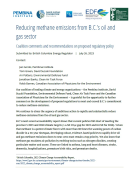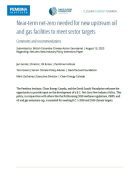
Jan Gorski is director of the Pembina Institute's government relations work, focusing on industrial decarbonization.
Jan has over a decade of experience working on climate and energy issues in the non-profit, government, and consulting sectors. Before joining the Pembina Institute, he was a senior advisor to Canada’s minister of energy and natural resources and before that the director of the Pembina Institute's oil and gas program. Jan has published extensive analysis and commentary on climate and energy issues throughout his career. He has also frequently appeared in the media and participated in government policy consultations.
After living in Alberta for 10 years, Jan now resides in Toronto.
Contact Jan Gorski
Jan Gorski's Research & Analysis
Review of AER response to Imperial Oil tailings leaks raises questions about environmental oversight
Despite failure to communicate impacts to Indigenous communities, AER’s response found to be in line with procedures

Reducing methane emissions from B.C.'s oil and gas sector
Submission to the British Columbia Energy Regulator

Design Principles for B.C.'s Output-Based Pricing System
Submission to British Columbia Ministry of Environment and Climate Change Strategy







